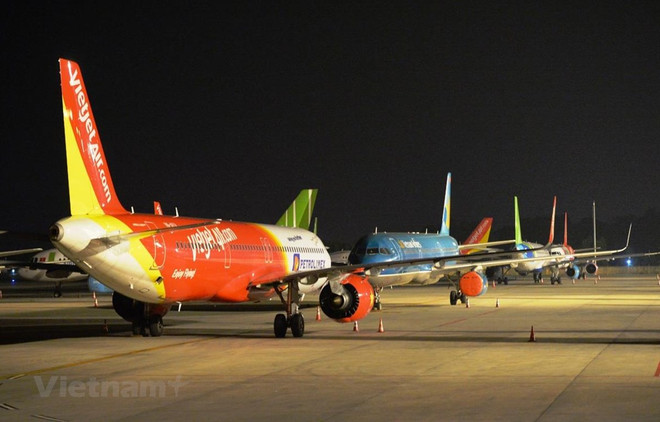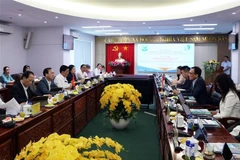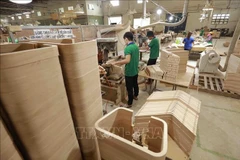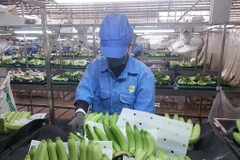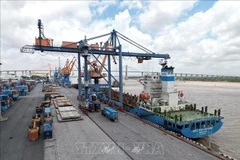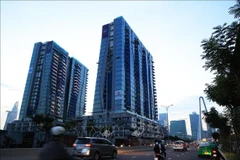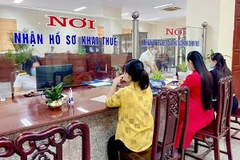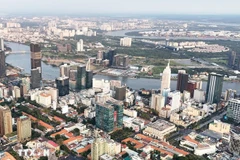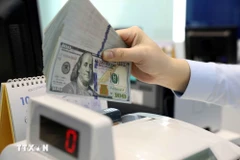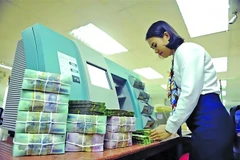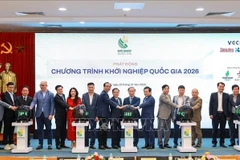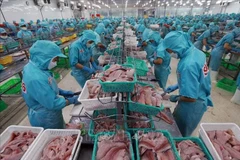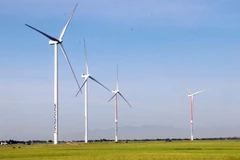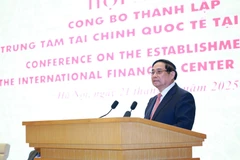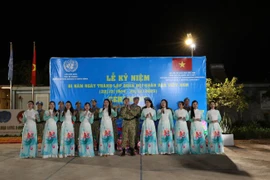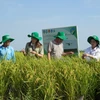After the outbreak of COVID-19, it has had a strong impact on the aviation industry, hundreds of planes lay idle and many aviation companies are facing the risk of bankruptcy.
Aircrafts stand still and the burden of costs
Mid-March forecast of the Civil Aviation Authority of Vietnam, the loss of Vietnam's aviation industry is up to 30,000 billion. However, the number will surely increase when the Ministry of Transport temporarily halts the domestic routes, especially the Hanoi-Ho Chi Minh route to prevent the spread of COVID-19.
For example, the Ministry of Transport requires airlines to operate only 1 trip / day on the Hanoi-Ho Chi Minh City route; Hanoi-Danang or Phu Quoc and Ho Chi Minh City-Danang Phu Quoc routes from March 30, 2020. This means the remaining 18 airports (including Van Don) are temporary put on hold.
At Noi Bai or Tan Son Nhat airport, it is easy to see the aircraft laid idle, even taking advantage of every possible place to arrange aircraft, both in the repair workshop area or on the taxiways.
With the travel ban, companies still have to pay trillions of dong to maintain the apparatus, pay wages, pay for aircraft rentals, maintenance, parking ...
Taking Vietnam Airlines as an example. Its fleet currently has 108 aircraft, including 15 Boeing 787 and 14 Airbus 350. Each month, the rent as well as the bank interest of a "super aircraft" is about 1 million USD. That makes the whole fleet’s rent and banks interest nearly 30 million USD / month.
Vietjet currently has 75 Airbus 320 and Airbus 321 operating, estimating an payable amount could be up to 20 million USD / month. This is not too difficult to estimate the amount that Bamboo Airways must pay for a fleet of 3 Boeing 787-9 aircraft and 20 narrow-body aircraft per month.
In addition to rent and bank interest, the airline also has to pay billions of dong for parking. Reportedly, the daily parking fee of an Airbus 321 is about 1.6 million dong, with the Boeing 787 line being 4.16 million VND. Therefore, for the parking fee each month, Vietnam Airlines has to spend over 6 billion VND dong; Vietjet about 3.6 billion VND; Bamboo Airways is about 1.24 billion VND.
Policies proposed to save aviation industry
According to estimates by the Asia-Pacific Aviation Center (CAPA), by the end of May, most airlines will go bankrupt if not receiving the immediate help from the government.
Recently, the Ministry of Transport has proposed a number of solutions such as applying a policy of 50% discount for takeoffs, landings and operating services for domestic flights.
According to airlines’ representatives, even when the epidemic ends, firms still need a minimum of 3-6 months to recover.
According to the provisions of Circular 53/2019 of the Ministry of Transport, airlines are obligated from 16 types of service charges at ports. Vietnam Airlines (including Jetstar Pacific and Vasco), Vietjet Air, Bamboo Airways in 2019 paid about VND 12,700 billion for direct and indirect fees. However, if the price is reduced to zero with 11/16 types of fees prescribed by the government, as proposed by the Ministry of Transport, the carriers can only reduce a few hundred billion dong in the cost as compared to their losses.
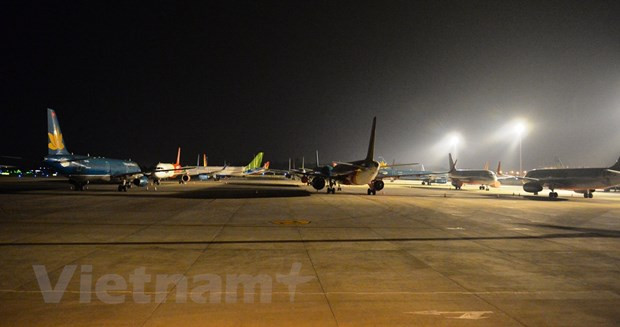 Each aircraft located in an untapped yard will incur a lot of parking costs, causing the airline to suffer economic losses in the context of the COVID-19 epidemic. (Photo: Hoang Anh/Vietnam+)
Each aircraft located in an untapped yard will incur a lot of parking costs, causing the airline to suffer economic losses in the context of the COVID-19 epidemic. (Photo: Hoang Anh/Vietnam+)
With takeoff, landings and flight control accounting for 10-20% of the total cost of each flight, the airline proposed a 50% reduction for both types of fees in the rest of 2020.
In addition, to stimulate the travel demand when the market recovers, it is essential to halve service fee for international flights and offer free service for passengers with domestic flights (currently priced at 70,000 to 110,000 VND per person) for 12 months
Of the 10 trillion VND of taxes that the aviation industry paid in 2019, the environmental protection tax alone accounted for nearly 50%. Therefore, the companies proposed a 50% reduction of fuel import tax and environmental protection taxes for 3 months or even exemption for three months.
Mr. Dinh Viet Thang, Director of the Aviation Authority of Vietnam, said that when the international routes hit the travel ban, the aviation industry was about to rely on the domestic market. However, after the order to reduce the number of domestic flight frequency, with the exception of key routes; coupled with the fact that each airline operating only one flight per day has led airlines to run out of financial resources.
According to Mr. Thang, the complicated evolution of the COVID-19 epidemic makes the aviation industry unable to make forecasts of output or growth in 2020.
“The biggest problem for airlines today is that the cash flow is limited. Even, the Civil Aviation Authority is worried that there might be bankruptcy. The history of Vietnam's aviation industry has never fallen into a difficult and tragic situation like now,”Mr. Thang said.
Airlines have reported to the Civil Aviation Authority about the current situation. Aviation Authority is consolidating to consider and report to relevant authorities.
Increasing cargo handling to compensate for losses
Amid the reduction of domestic passenger aircraft due to the evolution of COVID-19, Vietnam Airlines increased the operation of domestic and international cargo flights.
Specifically, in March and April, Vietnam Airlines deployed 195 flights transporting goods from major cities across the country or transported to foreign countries.
Cargo flights are operated by Boeing 787-9, Airbus A350 aircraft with the output of 20-25 tons / way, equivalent to the load utilization ratio of 95-100%.
“In the context that many flights to serve passengers have to be cut in both international and domestic markets, the increase in cargo fleet will help limit the situation of “aircraft grounding", waste of available resources of Vietnam Airlines and contribute a part of revenue to its production and business activities during this period, ”said the leader of Vietnam Airlines.
The airline is also continuing to research to promote the field of freight transportation from now to the end of the year to contribute to boosting the country's socio-economy development, and maintaining production and business activities before difficulties caused by COVID-19./.
